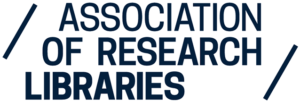 William Cross, Director, Copyright and Digital Scholarship Center, NCSU Libraries
William Cross, Director, Copyright and Digital Scholarship Center, NCSU Libraries
Association of Research Libraries Issue Brief (CC-BY)
Click here for the full Issue Brief (PDF)
Government Information at Risk
Access to government information is a fundamental principle in a democratic society. Particularly in the digital environment, government information is a driver for economic and social progress as well as a predicate for an informed citizenry.[1] From 2009 through 2016, open government was a hallmark of the Obama administration, which observed that, “openness in government strengthens our democracy, promotes the delivery of efficient and effective services to the public, and contributes to economic growth.”[2]
Libraries and archives have historically served as stewards of government documents, and in recent years, these institutions have paid special attention to the unique vulnerability of information during changeover in presidential administrations. Since 2008, these efforts have been spearheaded by archivists through projects like the End of Term Web Archive. In 2017, these issues have particular currency as contested information has been removed from numerous government websites and government officials are increasingly relying on commercial social media platforms such as Twitter to communicate with the public.[3] In response, many librarians, scholars, archivists, and other members of the public have come together to preserve government information with projects such as DataRefuge and Libraries+ Network.
Complex Legal Issues in Government Information
Despite a clear connection to their historical mission and the urgent need to preserve disappearing information before it is lost forever, archiving government information from webpages and social media sites raises several legal issues that may give some librarians and archivists pause. Although statutory language places works prepared by the federal government in the public domain,[4] much information shared on government sites that citizens rely on is protected by copyright. This is the case when third-party contractors create copyrightable materials for the government and when the government gathers and shares information from outside sources.
The complex copyright status of data may further complicate the question of archiving and sharing this information. Data itself is often not sufficiently creative to qualify for copyright protection, but a creative selection and arrangement of data may qualify for at least thin protection.[5] Data such as recorded interviews or narrative observations are likely to be protected by copyright, as are many data visualizations and other creative expressions of data. As a result, data from federal websites may, in many cases, be protected, as the licensing information on sites like Data.gov make clear.[6] Government webpages add further complexity to these questions when they incorporate third-party materials, such as videos, news stories, and embedded social media feeds. A final layer of complexity exists for librarians and archivists saving government content posted to social media sites, such as Twitter, which have explicit terms of service governing archiving and sharing.[7]
Fair Use Cuts through This Confusion
While navigating this mix of unprotected data, government works in the public domain, and protected works from third parties could be daunting for librarians and archivists, fair use provides ample support for archiving all of these materials. Unlike other statutory exceptions that apply only to a specific community or type of practice, fair use provides an equitable exception that permits librarians and archivists to tailor their practice to meet these challenges.[8] By permitting a flexible approach to archiving that balances several statutory factors, fair use cuts through copyright confusion to permit archiving that meets the core constitutional values at issue.[9]
Fair use acts as a “safety valve” for free expression that is at its strongest when used to protect the marketplace of ideas that would otherwise be harmed by copyright.[10] The text of the statute itself
enumerates a number of specific examples that highlight the role of fair use as a free expression safety valve[11] and courts have consistently affirmed this role.
In the context of archiving disappearing government information, established fair use jurisprudence aligns with library and archive engagement in at least three key areas:
- First, fair use has taken a central role in applying established copyright principles in the context of new and changing technology. Considering issues such as student-facing reserve collections,[12] archiving,[13] and search and discovery,[14] courts have made it clear that fair use sustains core library and archive practices in an environment of changing technologies.
- Fair use also plays a central role in correcting market failures such as exigent circumstances when seeking permission would be logistically difficult or administratively impractical. From the paradigmatic case of making multiple copies of a newly published newspaper article available for classroom reading to other cases when “the transaction costs unduly burden the social importance of the use,”[15] fair use assures that information can be shared where societally vital access requires immediate action.
- Finally, fair use provides powerful support for archiving and sharing when copyright would limit access to the information needed to sustain democratic culture.[16] Both fair use and the First Amendment are designed as safeguards not only for an individual’s right to speak, but also the community’s right to hear.[17]




